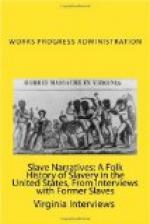“All the time Johny was preparing the food he was drinking the rum. When we went in he had many drinks inside of him and a quart bottle filled to take to the candy pull. ‘Hurry up boys and let’s finish up and go’ he said impatiently. ‘Don’t take him’ said the other boy, ’Dont you see he is drunk?’ So I put my arms about his shoulders and tried to tell him he had better sleep a while before we started. The poor boy was a breed. His mother was almost white and his father was a thoroughbred Indian and the son had a most aggravating temper. He made me no answer but running his hand into his pocket, he drew out his knife and with one thrust, cut a deep gash in my neck. A terrible fight followed. I remember being knocked over and my head stricking something. I reached out my hand and discovered it was the ax. With this awful weapon I struck my friend, my more than brother. The thud of the ax brought me to my senses as our blood mingled. We were both almost mortally wounded. The boss came in and tried to do something for our relief but John said, ’Oh, George? what an awful thing we have done? We have never said a cross word to each other and now, look at us both.’”
“I watched poor John walk away, darkness was falling but early in the morning my boss and I followed a trail of blood down by the side of the tracks. From there he had turned into the woods. We could follow him no further. We went to all the nearby towns and villages but we found no person who had ever seen him. We supposed he had died in the woods and watched for the buzzards, thinking thay would lead us to his body but he was never seen again.”
“For two years I never sat down to look inside a book nor to eat my food that John Sims was not beside me. He haunted my pillow and went beside me night and day. His blood was on my hands, his presence haunted me beyond endurance. What could I do? How could I escape this awful presence? An old friend told me to put water between myself and the place where the awful scene occurred. So, I quit working on the railroad and started working on the river. People believed at that time that the ghost of a person you had wronged would not cross water to haunt you.”
Life on the river was diverting. Things were constantly happening and George Arnold put aside some of his unhappiness by engaging in river activities.
“My first job on the river was as a roust-about on the Bolliver H Cook a stern wheel packet which carried freight and passengers from Nashville, Tennessee to Evansville, Indiana. I worked a round trip on her and then went from Nashville to Cairo, Illinois on the B.S. Rhea. I soon decided to go to Cairo and take a place on the Eldarado, a St. Louis and Cincinnati packet which crused from Cairo to Cincinnati. On that boat I worked as a roust-about for nearly three years.”
“What did the roust-about have to do?” asked a neighbor lad who had come into the room. “The roust-about is no better than the mate that rules him. If the mate is kindly disposed the roust-about has an easy enough life. The negroes had only a few years of freedom and resented cruelty. If the mate became too mean, a regular fight would follow and perhaps several roust-abouts would be hurt before it was finished.”




